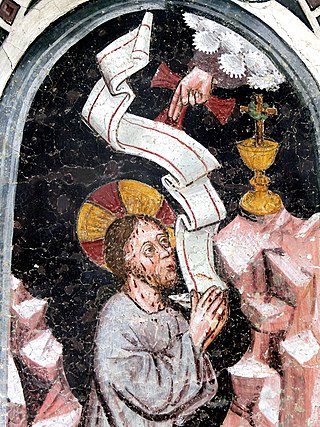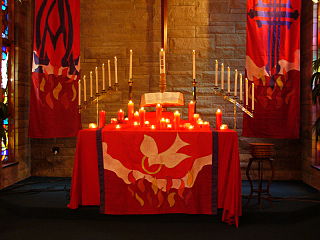
Christianity is an Abrahamic monotheistic religion based on the life and teachings of Jesus. It is the world's largest and most widespread religion with roughly 2.4 billion followers, comprising around 31.2% of the world population. Its adherents, known as Christians, are estimated to make up a majority of the population in 157 countries and territories. Christians believe that Jesus is the Son of God, whose coming as the Messiah was prophesied in the Hebrew Bible and chronicled in the New Testament.
The Christadelphians are a restorationist and nontrinitarian Christian denomination. The name means 'brothers and sisters in Christ', from the Greek words for Christ (Christos) and brothers (adelphoi).
The New Testament (NT) is the second division of the Christian biblical canon. It discusses the teachings and person of Jesus, as well as events relating to first-century Christianity. The New Testament's background, the first division of the Christian Bible, is called the Old Testament, which is based primarily upon the Hebrew Bible; together they are regarded as sacred scripture by Christians.

In religion and theology, revelation is the disclosing of some form of truth or knowledge through communication with a deity (god) or other supernatural entity or entities.
Sola scriptura is a Christian theological doctrine held by most Protestant Christian denominations, in particular the Lutheran and Reformed traditions, that posits the Bible as the sole infallible source of authority for Christian faith and practice. The Catholic Church considers it heterodox and generally the Orthodox churches consider it to be contrary to the phronema of the Church.

A spiritual gift or charism is an extraordinary power given by the Holy Spirit. These are believed by followers to be supernatural graces that individual Christians need to fulfill the mission of the Church. In the narrowest sense, it is a theological term for the extraordinary graces given to individual Christians for the good of others and is distinguished from the graces given for personal sanctification, such as the Seven Gifts of the Holy Spirit and the fruit of the Holy Spirit.
Nontrinitarianism is a form of Christianity that rejects the mainstream Christian theology of the Trinity—the belief that God is three distinct hypostases or persons who are coeternal, coequal, and indivisibly united in one being, or essence. Certain religious groups that emerged during the Protestant Reformation have historically been known as antitrinitarian.
The Church of God General Conference (CoGGC) is a nontrinitarian, Adventist Christian body also known as the Church of God of the Abrahamic Faith. The Church of the Blessed Hope, some of whose congregations also use the name Church of God of the Abrahamic Faith (CGAF), are a separate denomination, although they share the same origins.

Dr. John Thomas was a British religious leader and founder of the Christadelphians [Brethren in Christ Jesus]. He was a dedicated Bible Expositor, and author of Elpis Israel the First major writing to bring to light the subject of God Manifestation and the Hope of Israel for future generations. In this work, he was able to draw upon his understanding of Biblical Prophecy to predict the return of Israel in the near future, which came to pass in 1948, with the Balfour Declaration. Other of his writings include, Eureka a 5 Volume exposition of the Apocalypse, and the amazing accuracy of its remarkable history. [Copies of these works and many other are available at the Christadelphian Office, Birmingham UK]
John Barclay AM (1734–1798) was a Scottish minister of religion, and founder of the Bereans.
Prima scriptura is the Christian doctrine that canonized scripture is "first" or "above all" other sources of divine revelation. Implicitly, this view suggests that, besides canonical scripture, there can be other guides for what a believer should believe and how they should live, such as the Holy Spirit, created order, traditions, charismatic gifts, mystical insight, angelic visitations, conscience, common sense, the views of experts, the spirit of the times or something else. Prima scriptura suggests that ways of knowing or understanding God and his will that do not originate from canonized scripture are perhaps helpful in interpreting that scripture, but testable by the canon and correctable by it, if they seem to contradict the scriptures. Prima sciptura is upheld by the Anglican, Methodist and Pentecostal traditions of Christianity, which suggest that Scripture is the primary source for Christian doctrine, but that "tradition, experience, and reason" can nurture the Christian religion as long as they are in harmony with the Bible.

Bibliology, also known as the Doctrine of Scripture, is a branch of systematic theology that deals with the nature, character, and authority of the Bible.

In Christian theology, Hell is the place or state into which, by God's definitive judgment, unrepentant sinners pass in the general judgment, or, as some Christians believe, immediately after death. Its character is inferred from teaching in the biblical texts, some of which, interpreted literally, have given rise to the popular idea of Hell. Theologians today generally see Hell as the logical consequence of rejecting union with God and with God's justice and mercy.
The Unamended Christadelphians are a "fellowship" within the broader Christadelphian movement worldwide, found only in the United States and Canada. They are, like all Christadelphians, millennialist and non-Trinitarian. The term Unamended Christadelphians is not the formal name of this community but is used informally to identify the grouping since a statement of faith traditionally used by many in this community is the "Unamended Statement of Faith". Similarly, most of the much larger grouping of Amended Christadelphians traditionally use a statement of faith that has been amended and therefore, in North America is known by the prefix "Amended". Nevertheless, Christadelphians worldwide and both Amended and Unamended Christadelphians in North America share fundamentally the same doctrines, with a few exceptions.
The Berean Christadelphians are a Christian denomination.

The pre-existence of Christ asserts the existence of Christ prior to his incarnation as Jesus. One of the relevant Bible passages is John 1:1–18 where, in the Trinitarian interpretation, Christ is identified with a pre-existent divine hypostasis called the Logos. There are nontrinitarian views that question the aspect of personal pre-existence, the aspect of divinity, or both.
Presbyter is, in the Bible, a synonym for bishop (episkopos), referring to a leader in local church congregations. In modern Eastern Orthodox usage, it is distinct from bishop and synonymous with priest. Its literal meaning in Greek (presbyteros) is "elder".
Christian theology is the theology – the systematic study of the divine and religion – of Christianity and Christian belief and practice. It concentrates primarily upon the texts of the Old Testament and of the New Testament, as well as on Christian tradition. Christian theologians use biblical exegesis, rational analysis and argument. Theologians may undertake the study of Christian theology for a variety of reasons, such as in order to:

For the majority of Christian denominations, the Holy Spirit, or Holy Ghost, is believed to be the third person of the Trinity, a triune God manifested as God the Father, God the Son, and God the Holy Spirit, each being God. Nontrinitarian Christians, who reject the doctrine of the Trinity, differ significantly from mainstream Christianity in their beliefs about the Holy Spirit. In Christian theology, pneumatology is the study of the Holy Spirit. Due to Christianity's historical relationship with Judaism, theologians often identify the Holy Spirit with the concept of the Ruach Hakodesh in Jewish scripture, on the theory that Jesus was expanding upon these Jewish concepts. Similar names, and ideas, include the Ruach Elohim, Ruach YHWH, and the Ruach Hakodesh. In the New Testament it is identified with the Spirit of Christ, the Spirit of Truth, the Paraclete and the Holy Spirit.

The different Denominations of Christianity have variations in their teachings regarding the Holy Spirit.








